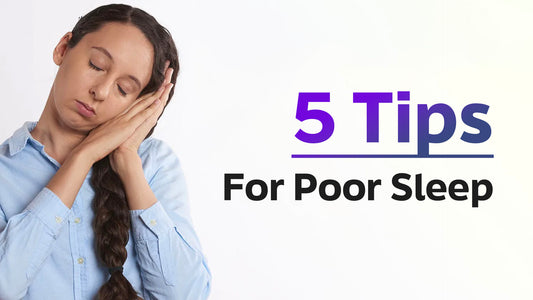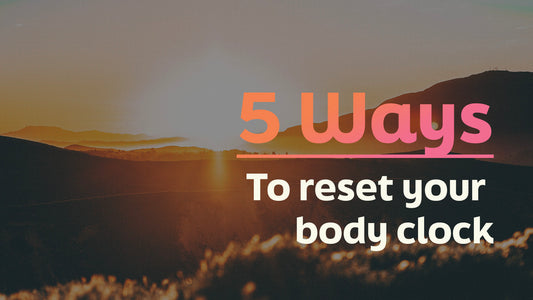In our last blog post "Could Caffeine Be Your Sleep Thief", we discussed some of the problems that caffeine is causing for our sleep.
Here, we wish to outline our top 10 tips for developing a positive relationship with caffeine that will allow you to sleep better and still enjoy your coffee!
1. Set an unbreakable curfew – always enjoy your caffeine before noon (or earlier)
This means that your body will have time to remove the majority of it from your system before bedtime. The optimal curfew for most people will be 12 noon, however, if you are particularly sensitive to caffeine you might want to make your curfew earlier or even avoid it altogether.
2. Wait a few hours after waking up until you take your hit
Circulating levels of the stress hormone cortisol are naturally highest in the morning upon waking. If you wake up feeling at-all stressed, there’s no need to add to this, so glide gently into your day and enjoy the benefits of mid-morning caffeine without overloading your system.
3. Fatten up your brew
Dietary fats slow down the digestion and absorption of other foods and beverages when consumed together. By adding healthy natural fats to your coffee or tea, you slow down the absorption of the caffeine into your system – this prolongs the caffeine high and reduces the spike of stress hormones caused by rapid absorption.
Some great fats to use include organic-coconut (butter, cream or oil) and grass-fed dairy (cream, butter) – just be careful with portioning as extra calories can quickly build up – less is more.
Bulletproof coffee is a very popular (and tasty) fat-based beverage made popular in the biohacking world.
4. Avoid caffeine on days that you are particularly stressed or have had issues sleeping
Although it feels like caffeine will help you to get through the day, this just adds more weight to your current sleep or stress issues by jacking up levels of anti-sleep stress hormones (cortisol and adrenaline) even further.
Our advice in this situation is to engage in relaxing mind-body techniques to de-stress so that your sleep can recover the following night. This might include simple breathing techniques, a walk in nature or some gentle restorative yoga – we won’t tell you how you should personally relax, but just make sure that you do.
These days should also be accompanied by a healthy dose of self-compassion!
5. Boost your mood and energy naturally in the morning
It’s important to replace the (fake and temporary) energising and mood-boosting effects brought about by caffeine.
Consider spending a few minutes under a cold shower and make sure to expose your eyes to 15 minutes of natural light each morning. Both of these activities stimulate your body to produce the feel-good hormones that we’re really searching for including serotonin, dopamine and endorphins – nature’s high – WOO!
6. If you’re worried that you can’t function optimally without caffeine, wean or reduce your consumption
The reality is that caffeine is a powerful stimulant and it can be a wonderfully pleasant part of our lives if we respect it.
If you believe that you consume too much caffeine and you would like to make changes, but you feel that you rely on it for performance in your job (which isn’t disappearing any time soon) the reality is that you need to rewire your body to use it on a more productive basis so that you can get the most bang for your buck.
You may have a hard time giving up caffeine cold turkey. Although this is necessary for some people, the far more realistic approach might be to change the source or amount of caffeine that you are consuming, thereby softening its impact.
You might want to swap out coffee for a caffeinated tea (such as Early Grey, matcha, yerba mate or English breakfast). These still have a nice amount of caffeine, but only one-third to half the amount that you would find in a brewed cup of coffee.
A slower approach can also be useful if you want to gradually withdraw from consuming caffeine altogether but fear the side-effects of going cold turkey.
7. Get accountable to others
Never underestimate the power of accountability and allowing other people to support you to change.
Telling people what you are doing and why can be a great way to improve your incentive to change health behaviours, especially if you are stuck in negative caffeine habits with low motivation.
It could also be a great opportunity to invite others to change their habits with you (such as your colleagues in the office) but remember to acknowledge and show respect for their personal readiness. Nobody likes being told what to do, and any decisions to change must be self-motivated to be sustained.
Their caffeine knowledge might not be as “woke” as yours – but that’s okay – others are entitled to do whatever makes them happy.
It is often most effective to inspire change in others by demonstrating it yourself, rather than trying to pour your opinion down their throat like the hot cup of joe that you so desperately want to break up with.
8. Enjoy decaffeinated coffee or naturally caffeine-free beverages
If you are particularly sensitive to caffeine, then decaffeinated beverages are a great option as they contain only 15-30% of the caffeine in a regular cup. This will satisfy your caffeine fix without overloading your system.
However, the fact that decaffeinated is not ‘caffeine-free’ does mean that even decaffeinated drinks need to be avoided after your caffeine curfew (noon).
You are likely better off enjoying a naturally caffeine-free drink, such as the wide range of herbal teas that are now available.
PS. We'd hedge our bets that you wouldn’t drink poor quality coffee, so do yourself a favour – spend a little bit extra and treat yourself to a high-quality herbal tea that you’ll really enjoy.
9. Establish ‘on’ and ‘off’ days
We can use caffeine strategically to increase alertness and focus, or, we can over-consume it and suffer the consequences.
Having ‘on’ and ‘off’ days can help to keep our body in balance and our caffeine tolerance in check. To maximise the potential benefits from caffeine, usage is best cycled.
You will need to establish your own ‘on’ and ‘off’ schedule that fits into the context of your own life.
Perhaps you are like us and would benefit from having Wednesdays and Weekends off from caffeine?
We call this the caffeine working week because this schedule allows caffeine to work for us, and not the other way around.
You might decide that there are certain days that caffeine consumption works better for you. The important take away of this tip is to consume caffeine infrequently so that your body’s response to caffeine doesn’t down-regulate over time – this is where problems emerge.
10. Teach the next generation of kids healthy caffeine habits
This last tip is more of a recommended rule.
Please do not give caffeine to any of your children, friends or relatives under the age of 18 – I feel very strongly about this.
Children should have no concerns with energy levels. The hyperstimulation caused by caffeine is more likely to induce stress or sleep issues than bring any benefit.
We believe that it is important to instil good caffeine habits from a young age, especially because over-exposure to caffeine during this crucial time of brain development increases the likelihood of the development of an addictive or dependant relationship with it as an adult.
Somethings are best enjoyed in adulthood, let caffeine be one of them…
Summary – are we still friends?
We hope that this article has helped you to see that caffeine is not ‘bad’, but the issue is that millions of us aren’t having just one serving per day.
We’re having many, and this is having a far-reaching negative impact on our lives.
By taking a week or two to reset or readjust your relationship with caffeine you can ensure that it works for you, not against you.
- Have you previously taken a break from caffeine?
- Are you struggling to break the overcaffeinated, underslept cycle?
- Do you find that caffeine impacts stress or other areas of your life?
- Do you have any advice or tips that you would like to share with others?
We'd love to hear from you!
Every like, share and comment on this blog post enables us to reach a wider audience and provide more free online content that will help us to change more lives.
Thank you for all of your support.
Please get in touch if you have any questions!
In health,
Dan & Jamie
PS. Don´t forget to… Like our page on Facebook, Connect with Dan on LinkedIn and Follow us on Instagram


